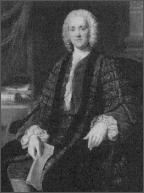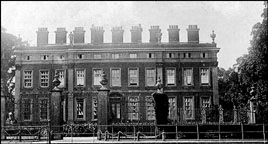
George Grenville, who served as Prime Minister from 16 April 1763 to 10 July 1765, was the second son of seven children born to Richard Grenville and his wife Hester, Countess Temple. His elder brother was Richard, Earl Temple, Lord Cobham; his sister Hester married William Pitt. Grenville, who was born on 14 October 1712 at Westminster in London, was educated at Eton between 1725 and 1728, going on to Christ Church, Oxford, in 1730. He was called to the Bar in 1735. In 1741 he was elected as MP for Buckingham, a pocket borough of his uncle Richard, Viscount Cobham, with only thirteen electors. In his early years in parliament, Grenville was a member of his uncle's faction known as "Cobham's Cubsm" which included Pitt (the Elder). This group opposed Walpole's government, which fell in 1742. In 1744 Grenville entered Pelham's government but was dismissed by the Duke of Newcastle's administration in 1755, only to be brought back into government in 1756 as Treasurer to the Navy.
In May 1749, Grenville married Elizabeth Wyndham, the grand-daughter of the Duke of Somerset, after postponing the wedding in the hope of receiving a large legacy. Somerset disapproved of the match and left Elizabeth a very small allowance in his will. The couple had four sons and five daughters: one of their sons(William Wyndham Grenville, Lord Grenville) became PM in his own right.

Wotton House, Wotton Underwood, Buckinghamshire: the country residence of George Grenville.
During Newcastle's ministry (1754-62), Grenville became increasingly friendly with the Earl of Bute and the so-called 'Leicester House Set'; these were the political followers of Frederick, Prince of Wales. The Leicester House Set comprised a group of politicians that was out of power but hoped to be given power when the Prince of Wales succeeded to the throne. Unfortunately for them, Frederick died in 1751.
Grenville gained a reputation in the House of Commons as an expert on procedural matters. When George III succeeded to the throne in 1760, Grenville joined Bute in urging an end to the Seven Years' War, whereas the government (particularly Newcastle and Pitt) was in favour of continuing the conflict. In 1761, Grenville was appointed as Leader of the House of Commons. In May 1762, the Duke of Newcastle resigned and Bute formed a ministry with Grenville being made Secretary of State for the Northern Department. His brother-in-law, Lord Egremont was Secretary of State for the Southern Department. However, Bute opened the peace preliminaries with France without consulting his Cabinet and Grenville opposed him. Consequently, Bute demoted him to First Lord of the Admiralty, a post that Grenville was forced to accept because he needed the money: since the break with his brother, Lord Temple, the previous year, Grenville had no private income.
After the signing of the Peace of Paris, Bute introduced the Cider Tax in an attempt to pay off the national debt. Grenville spoke in favour of the duty, earning himself the ridicule of the Commons. Also, he was included in the riots that occurred in opposition to the tax. On 16 April 1763, much to his surprise, Bute asked Grenville to take over as PM. Grenville accepted, even though Bute had appointed most of the Cabinet. Although Grenville was extremely able and a competent administrator but he appeared to be self-willed, and politically was limited because
- he was shallow, humourless and verbose
- he had incurred Pitt's wrath for serving under Bute and
- he did not have the King's wholehearted support.
- he further alienated George by demanding that the King should have nothing to do with Bute.
George III said of Grenville: 'His opinions are seldom formed from any other motives than such as may be expected to originate in the mind of a clerk in a counting house' and 'When he has wearied me for two hours he looks at his watch to see if he may not tire me for one hour more'. Since one of the main elements needed to conduct a stable ministry was Royal support, Grenville did not have an auspicious start to his ministry.
A week later, John Wilkes published Number 45 of the North Briton which contained a vicious attack on the King's Speech concerning the Peace of Paris. Grenville's government promptly issued a general warrant for the arrest of 'the authors, printers and publishers of a seditious and treasonable paper, entitled the North Briton, Number XLV'.
This act by the government raised three constitutional issues:
- Were General Warrants legal? Certainly they were against ideals of the Glorious Revolution, possibly infringed the Bill of Rights and were contrary to Habeas Corpus
- Could MPs be arrested for freedom of speech? Was it a move against parliamentary privilege?
- Was the freedom of the Press endangered?
Wilkes and forty-eight others who were involved with No 45 were arrested. After a trial, Wilkes was acquitted, resumed publication of the newspaper and his seat in the Commons. From then on it was indirectly assumed that the press had the right to comment on/criticise parliament, and report debates. Wilkes was unpopular in parliament but to the electorate he became a symbol of liberty and radicalism. In 1764 he disgraced himself and fled to France to escape prosecution. He was dismissed from parliament.
Grenville lost much credibility over his handling of the Wilkes affair but other factors helped cause the fall of his ministry:
- financial problems for Britain
- colonial problems
- George III disliked him
In order to finance the Seven Years' War, the government had borrowed money from the Dutch, merchant bankers, the Bank of England (established in 1694), private companies and individuals, at high rates of interest. Grenville believed that he had to try to pay it off, but could not afford to upset Independent Gentlemen in so doing. He therefore:
- left the land tax at 4/- in the pound, which was not popular. Under peacetime conditions, the land tax stood at 3/- in the pound and most people expected the tax to be reduced after the signing of the Peace of Paris in 1763.
- cut expenditure in army and navy after the Peace of Paris was concluded. This was seen as more weakness on the part of the government, especially with the growing Empire. Grenville also believed that since Britain was defending the Empire, the colonies should help meet costs. Consequently he
- introduced new forms of taxation in America
In 1764 the Sugar Act was passed. This reduced the molasses duty of 6d per gallon to 3d but Grenville enforced payment through stricter customs controls in the thirteen colonies. The Sugar Act did not raise as much revenue as had been expected so in March 1765 the Stamp Act was passed. It was to be implemented in America on 1 November 1765. The Act extended the British Stamp Act to America and taxed all newspapers, legal documents, licenses, dice, playing cards and official documents. Both of these pieces of legislation were passed easily by parliament despite colonial opposition. The result of the passing of the Stamp Act were the Stamp Act riots throughout the American colonies, beginning in August and culminating in the Stamp Act Congress in October. In America, 'no taxation without representation' became the cry. However, Grenville did not have to deal with the colonial problems that resulted in his policies because he was invited to resign by George III in July 1765.
In the spring of 1765, George III had his first bout of mental illness which resulted in him becoming absent-minded and incoherent; he was unable to fulfil his duties as monarch. Although his illness did not last long, it did raise the question of a Regency Council, in case the King was removed for any length of time or if he died. Consequently, Grenville introduced the Regency Bill. The king specified that the Regent should be either the Queen or another member of the Royal Family but his Ministers decided to remove the name of his mother because of her close friendship with Bute. George III took this as an insult and ordered that her name should be reinserted. Grenville also had to deal with the silk-weavers' riots, caused by the government's failure to restrict the import of foreign silk. The king blamed Grenville for the riots.
During Grenville's ministry George III was extending Buckingham House and resented Grenville's insistence on economies. The King wanted his London home to be a suitable residence for the monarch and thought Grenville was miserly. All these factors led to the fall of Grenville's ministry in July 1765 when he was persuaded to resign, to make way for a ministry headed by the Duke of Cumberland with the Marquis of Rockingham as First Lord of the Treasury. Grenville went into opposition and did not hold office again. He opposed any measures of conciliation for the American colonies, voting against the repeal of the Stamp Act. Grenville's opposition to most government measures in the period 1765-70 resulted in him losing more and more credibility as a politician.
In the summer of 1770, Grenville became ill. He had suffered from a recurring respiratory illness throughout his life that had caused him to leave London for months at a time. On 13 November 1770, the day of the opening of parliament, Grenville died in London of a blood disorder.
Recommended Reading
Lawson, P. George Grenville: A Political Life. Oxford 1984.
Wiggin, L. M. The Faction of Cousins: a Political Account of the Grenvilles 1733-1763. New Haven, 1958.
Last modified 19 February 2002